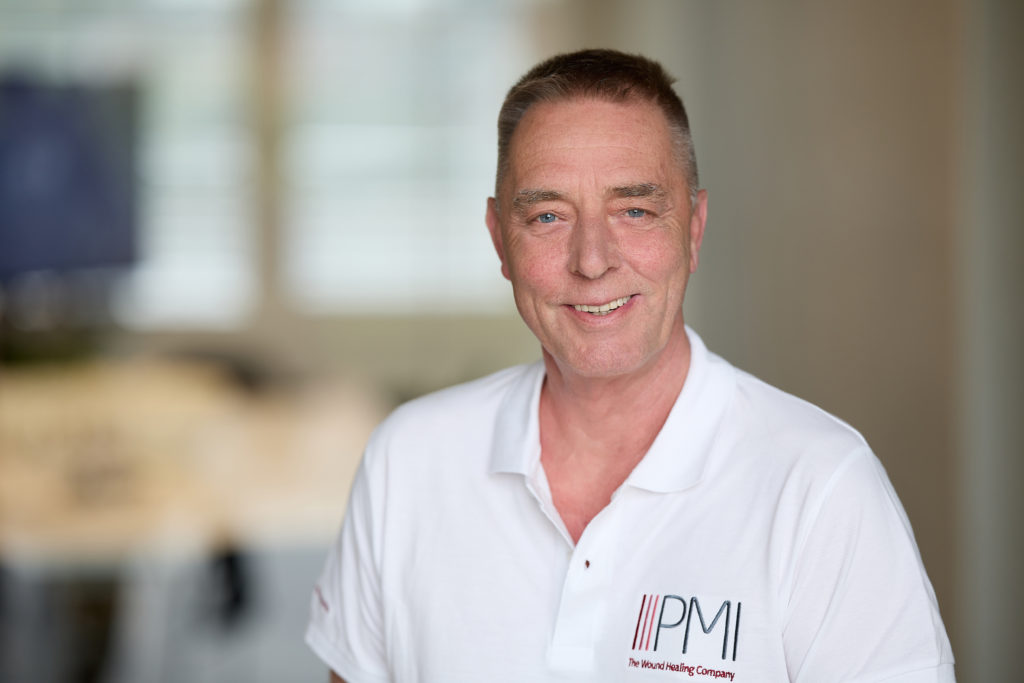“It’s the team that makes the dream come true,” says PMI CEO Christian Planck with conviction. So it’s clear the stage for members of the team who tell us about their tasks and explain what makes their work at PMI special and what motivates them.
Michael Baransky has been with PMI for over a decade. He is the company’s longest-serving field service representative and has played a decisive role in PMI’s growth. In many cases he has seen the effect of Suprathel at first hand and considers it to be a blessing, especially for children. Retiring in the fall of 2023, he will continue to support PMI as an external consultant.
When did you join PMI, Mr Baransky?
I joined PMI in 2012 as a field sales representative for Suprathel. Initially I was supposed to provide cover for the new federal states in eastern Germany, but at some stage I had half of the country on my agenda. I was sent abroad too, from Austria and Switzerland to Sweden and Hungary. Now I work only in Germany. There are now five of us—field sales representatives—in Germany.
What exactly do you do?
I visit hospitals and present our product, talk with doctors and nurses, send samples and attend the first procedure in the operating room. Wound care comes next; that is for the nursing staff. I also run courses and hold lectures. And I look over shoulders to see whether the product is used in the most effective way.
An important aspect of my job is to be visible and accessible. I sometimes call at clinics just to say hi. A team member there will usually remember that he or she has long wanted to learn more about Suprathel or to place an order with us. Once, on request, I gave a talk at a pediatric surgery symposium in Mainz as the only “non-specialist” to do so.
Today Suprathel is the gold standard for treating burns. Has that made the product easier to sell?
Yes and no. On the one hand the community is small. Take pediatric surgery, for example. If a product is good, the news spreads fast. I have actually been approached and invited to hospitals to present our product.
On the other hand, Suprathel needs explanation. That is due less to the product than to changing personnel, especially in nursing. Once the physician has applied Suprathel the nurses are in charge of wound care. Suprathel requires changes to the nursing schedule, and they are significant. Conventional wound care provides for regular cleaning right down to the base of the wound. Suprathel in contrast, once applied, stays on the wound. Only the bandage is changed.
You have been an advisor on medical products all your working life. How has your job changed?
At the beginning of my career, nearly 40 years ago, I talked with the senior physician, maybe together with the head of nursing. If they were convinced of the product, they called Purchasing and said they needed it on the table the day after tomorrow. That was it.
Today, when many clinics are run on the basis of the shareholder value principle, I don’t even get my foot in the door without first reporting to Procurement. If the physician is convinced of the product Controlling decides whether it is purchased. If the Administration says no, a three-year-old child may die. That has really happened, and I find it incredibly frustrating. Only a few years ago they would have done everything they could to help—at least for children.
You are retiring in the fall of 2023. Do experiences of that kind make retiring easier for you?
Definitely. The trend really saddens me. My daughter, who worked in a hospital for a long time, felt just the same. She changed her profession.
Back to the positives: which highlights are you taking with you?
Before joining PMI one of my jobs was for a manufacturer of incubators used in neo-natology. I know what it is like when children, especially infants, are scared. And I know what it means to be able to take away their fear. For conventional bandage changing of burns children not infrequently have to be put under anesthesia because they are rightly afraid of the pain. When Suprathel is used I have seen many children follow the bandage changing inquisitively. That makes me proud.
And then there is the development of PMI, in which I have played an active part. In 2012 we had three little offices in Denkendorf industry park. In July, when I stood in front of our new building at its inauguration, I could hardly believe it.
I see PMI as a close-knit society, a kind of family. To fit in, you need to be a little different. You need to have many skills, you must never say no, everybody must pitch in, everyone is a part of the whole. Office staff pack parcels if the schedule is tight and the boss will grab a brush and sweep the booth clean at a medical congress.
What are you looking forward to?
A consulting contract will keep me in contact with PMI. In the new building we have plenty of space for training and lectures. At last! Customers have repeatedly wanted to visit us, which wasn’t possible in the old premises. Especially as we are often seen as a division of a large corporation and it is always a pleasure to say how small we were to begin with.
So in the future I weill have the best of two worlds: PMI with its convincing products and its great team, but without pressure on me to make sales.




